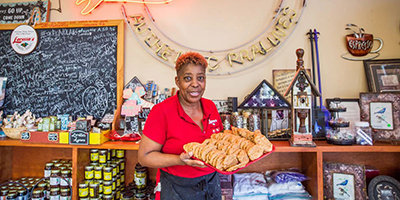By Birmingham Times
(Source: Birmingham Times)
Clair Lorell
eater.comLoretta Harrison, a cherished New Orleans chef and the founder of Loretta’s Authentic Pralines, the city’s first praline shop owned by an African American woman, died on February 16, 2022, at the age of 66, reports WWL.
New Orleans was first alerted to Harrison’s death Wednesday night by social media posts from Malik Bartholomew, a family friend and the proprietor of Know NOLA Tours, who noted that Harrison owned and operated two locations of her own praline company for over 35 years, was a graduate of New Orleans’s Southern University, and was one of few chefs to maintain the Creole tradition of cooking calas, or sweet, rice-based fritters. NOLA.com is reporting that Harrison died at Ochsner Medical Center from cancer.
Harrison’s family released a statement Thursday, according to WWL, that read in part: “She was a proud entrepreneur who advocated for local business owners, cultural and culinary arts, and civil liberties for all. Her daily joy was welcoming anyone who walked into her shop with a smile, a warm meal, and a heartfelt prayer. She was a woman with incredible grace and moral fortitude, and was a guiding light who lit up our lives with infinite love. We could always turn to her for wisdom and solace, and her absence is wholly felt in our hearts.”
Pralines are known as New Orleans’s signature candy, and have huge historical significance as a symbol of the city’s Black culinary heritage and tradition. Praline scholar Chanda M. Nunez wrote in 2011 that pralines, one of the earliest street foods, evolved thanks to the “culinary genius of African American women.” Harrison’s founding of Loretta’s Authentic Pralines in 1983 after getting her start as a Jazz Fest vendor a few years prior continued that legacy, as the first African American woman in New Orleans to own and operate a praline company.
Harrison’s first location was at Jackson Brewery along the Mississippi River in the French Quarter. Eventually, she moved it to the French Market and in the 1990s opened a location on North Rampart Street in the Marigny, also an ice cream shop and restaurant that served Creole specialties like stuffed peppers and calas as well as pie, cookies, and king cake. Harrison had made a splash in the city once again in the last decade with her praline beignet creation, which won the top prize at New Orleans’s inaugural Beignet Fest in 2016. Her stuffed beignets, both sweet and savory, have since become as much of a draw as the pralines for Loretta’s customers.
Harrison told Eater in 2016 that her mother made pralines on the weekends growing up in St. Bernard Parish, and that she was allowed to help beginning at eight years old. She said her shops use a recipe passed down from at least three generations of women in her family, “maybe more.”
“A lot of food our ancestors used to do is becoming a dying art, and the younger generation won’t fool with it,” Harrison said. “My sons better. Not just because it’s good money, but the history. We have to keep the history of our food, our culture, our city alive.” According to NOLA.com, Harrison had had three sons: Roddrick Harrison, Kendrick Harrison, and Robert Hill.
There was no word on plans for services at the time of this writing.

